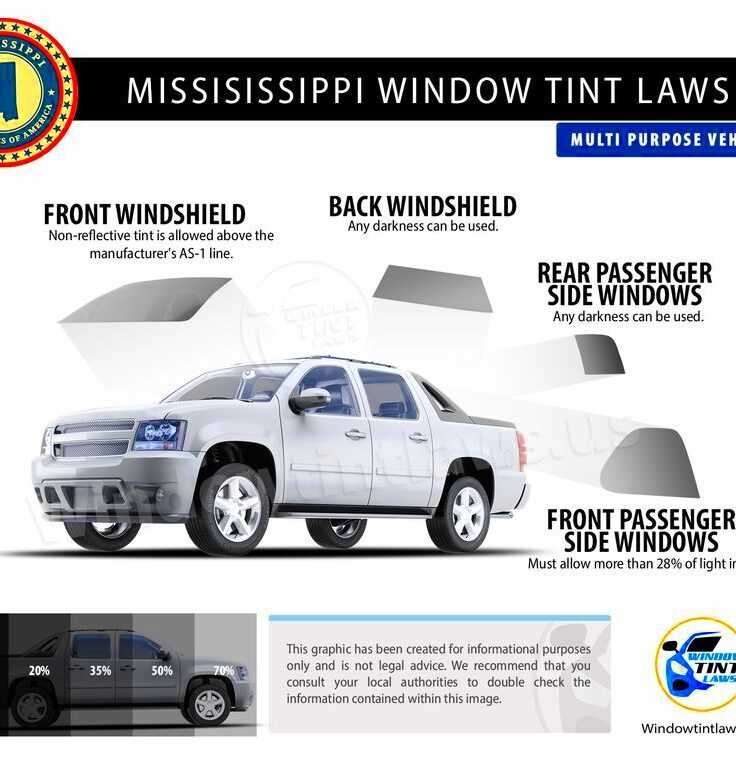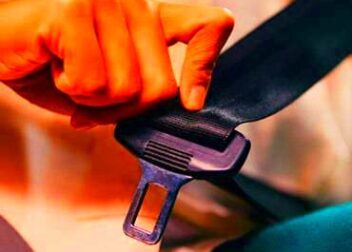Window Tint Laws in Mississippi and What Drivers Should Know
Window tinting is a popular choice among drivers in Mississippi, not just for style but also for privacy and protection from the sun. However, it’s essential to understand the laws governing window tinting in the state. Each state has its own regulations regarding how dark and reflective window tints can be, and Mississippi is no exception. Knowing these laws can help you avoid fines and ensure that your vehicle complies with state standards. Let’s dive into why these regulations matter and what you need to know to stay within the legal limits.
Understanding the Importance of Window Tint Regulations
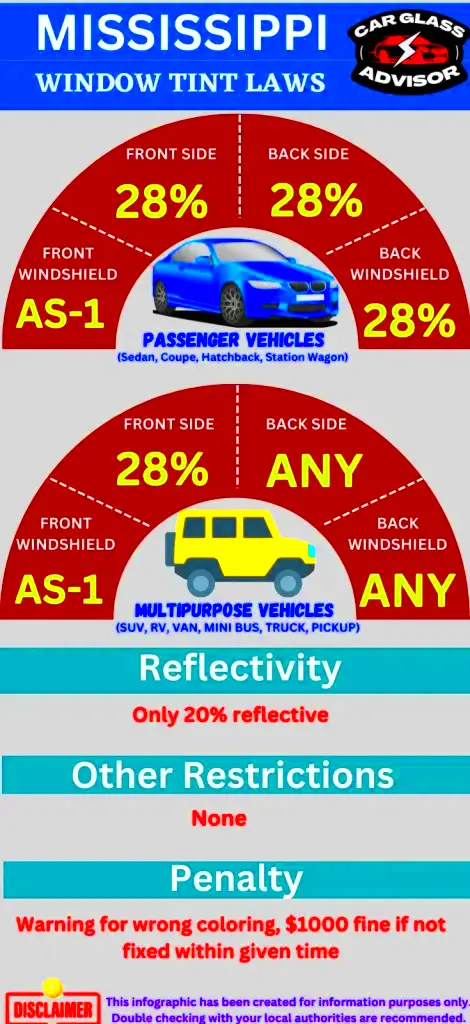
Window tint regulations are designed for several reasons that benefit both drivers and the public. Here are some key points to consider:
- Safety: Regulations help maintain visibility for drivers and reduce accidents caused by glare or obstructed views.
- Law Enforcement: Clear visibility into vehicles helps law enforcement officers perform their duties effectively. If a vehicle’s windows are too dark, it can hinder their ability to assess potential threats.
- Privacy vs. Public Safety: While many people value their privacy, the laws balance personal preference with the need for public safety. Proper regulations ensure that everyone can feel secure on the roads.
In short, understanding and following window tint laws is crucial for your safety, the safety of others, and your legal protection.
Legal Tint Darkness Limits for Different Windows
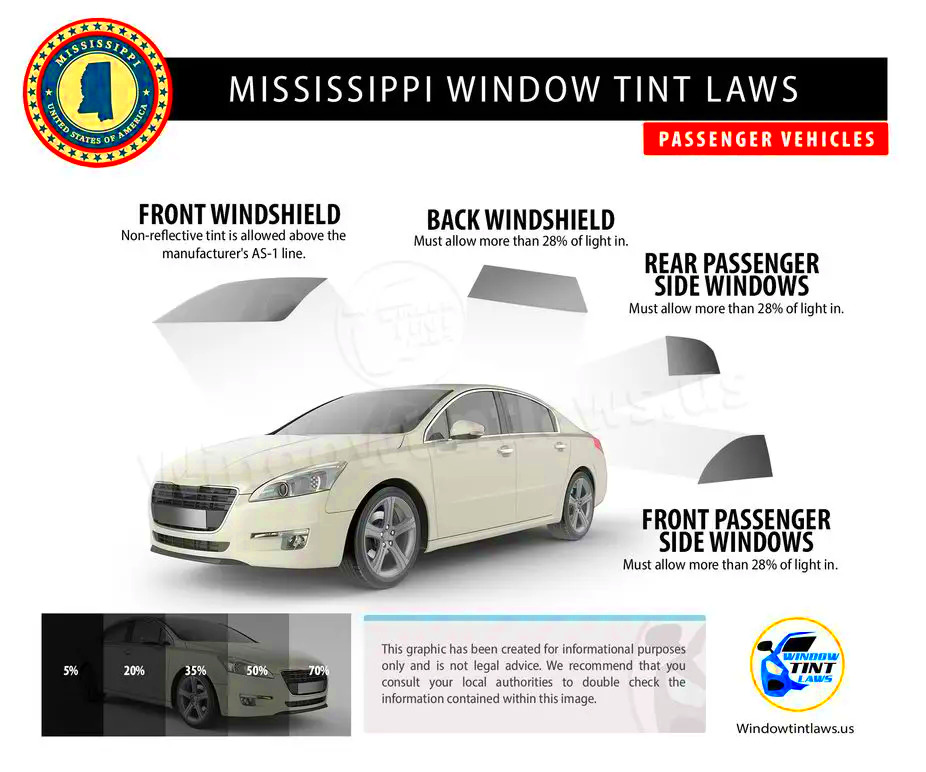
In Mississippi, the law outlines specific limits for how dark window tints can be, which vary depending on the type of window. Here’s a breakdown:
| Window Type | Visible Light Transmission (VLT) Percentage |
|---|---|
| Front Windshield | Not less than 70% |
| Front Side Windows | Not less than 28% |
| Back Side Windows | No Limit |
| Rear Window | No Limit |
The Visible Light Transmission (VLT) percentage indicates how much light can pass through the tinted glass. For example, a VLT of 70% means that 70% of light can pass through, while 30% is blocked. Front windshields and side windows have stricter limits to ensure safety and visibility. Back side and rear windows have no such limits, allowing for more flexibility in tinting.
Before applying window tint, it’s important to check your tint’s VLT percentage to ensure it complies with Mississippi laws. Being aware of these limits can save you from potential fines and keep you safe on the road.
Reflectivity Standards for Window Tint in Mississippi
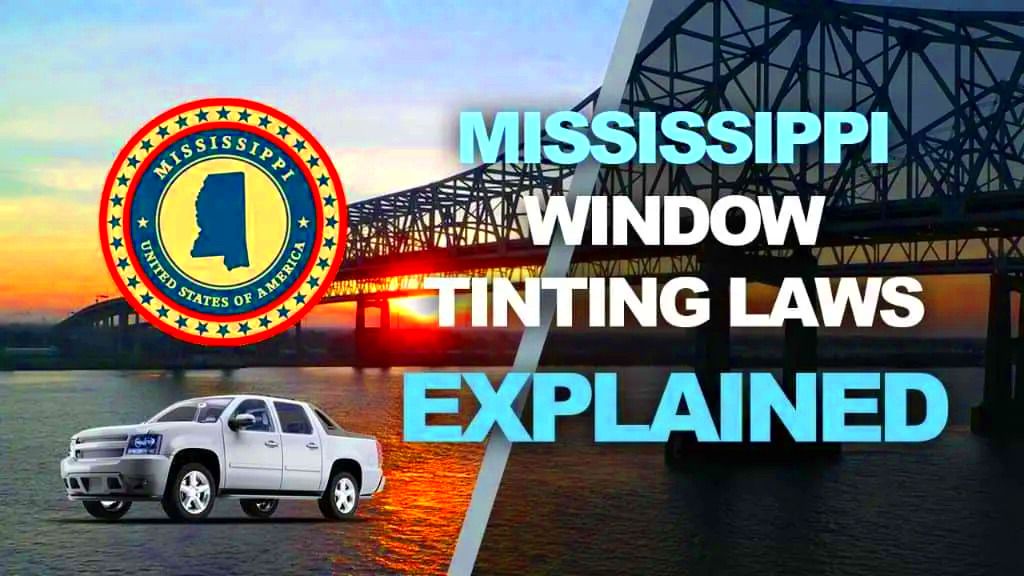
In addition to darkness limits, Mississippi also has specific reflectivity standards for window tints. Reflectivity refers to how much light is reflected away from the surface of the window, which can impact visibility and safety. Understanding these standards is crucial for any driver considering window tinting.
The law sets the following reflectivity limits for different types of windows:
| Window Type | Reflectivity Limit |
|---|---|
| Front Windshield | Not more than 25% reflective |
| Front Side Windows | Not more than 25% reflective |
| Back Side Windows | No Limit |
| Rear Window | No Limit |
Having a high reflectivity can create glare issues, which is why these regulations are in place. By keeping the reflectivity below the specified limits, you not only ensure compliance with the law but also contribute to safer driving conditions for yourself and others on the road. Remember, it’s always best to consult a professional when choosing your window tint to ensure it meets both darkness and reflectivity standards.
Medical Exemptions for Window Tint Laws
In Mississippi, there are provisions for medical exemptions to window tint laws. If you have a medical condition that requires you to protect yourself from sunlight, you may be eligible for special window tinting. Here’s what you need to know about these exemptions:
- Conditions Covered: Medical exemptions often cover conditions like lupus, skin cancer, and other light-sensitive diseases.
- Documentation Required: To qualify for an exemption, you’ll need a signed statement from a licensed physician. This document should specify your condition and the need for additional tinting.
- Application Process: After obtaining your doctor’s note, you may need to apply for a permit from your local Department of Motor Vehicles (DMV).
It’s essential to keep the necessary paperwork in your vehicle to avoid fines. Having proper documentation will help you enjoy the benefits of window tinting while staying compliant with Mississippi laws. If you believe you qualify, don’t hesitate to consult your doctor and begin the exemption process.
Penalties for Violating Window Tint Laws
Understanding the penalties for violating window tint laws in Mississippi is crucial for all drivers. Getting caught with illegal window tint can lead to several consequences, which can vary based on the severity of the violation. Here’s what you need to know:
- Fines: Typically, the first offense can result in a fine ranging from $100 to $250. Subsequent offenses can lead to higher fines.
- Traffic Stops: If law enforcement stops you for a window tint violation, they may issue a citation, which can also lead to points on your driving record.
- Fix-It Tickets: In some cases, you might receive a “fix-it” ticket, which allows you to remove the illegal tint and provide proof to avoid fines.
To avoid these penalties, it’s best to have your window tint professionally installed and ensure it meets all legal requirements. Regular checks of your tint can also help you stay compliant. Ignoring these laws can lead to unnecessary headaches and costs, so staying informed is key to enjoying your tinted windows without worry.
How to Choose the Right Window Tint
Choosing the right window tint can feel overwhelming, especially with so many options available. But don’t worry! By understanding your needs and the legal requirements, you can make an informed decision. Here are some factors to consider:
- Purpose: Determine why you want to tint your windows. Is it for heat reduction, UV protection, privacy, or aesthetics? This will guide your choice.
- VLT and Reflectivity: Ensure the tint meets Mississippi’s legal limits for visible light transmission (VLT) and reflectivity. Refer to previous sections for these limits.
- Material: Tints come in various materials such as dyed, metallized, ceramic, and hybrid. Each has its pros and cons:
- Dyed: Affordable and great for privacy but may not block as much heat.
- Metallized: Durable and good at blocking heat but can interfere with electronic signals.
- Ceramic: Offers excellent heat and UV protection without affecting visibility or electronics.
- Professional Installation: Consider having your tint professionally installed to ensure it meets legal standards and looks great. DIY installations can lead to mistakes and potential legal issues.
By carefully considering these factors, you can select a window tint that suits your style and complies with Mississippi laws, enhancing both your comfort and vehicle appearance.
Conclusion on Window Tint Laws in Mississippi
In summary, understanding window tint laws in Mississippi is essential for every driver. These laws are in place to promote safety, visibility, and public welfare while allowing individuals to enjoy the benefits of tinted windows. Knowing the limits on darkness and reflectivity can help you avoid fines and legal troubles.
Whether you’re considering window tint for heat reduction, privacy, or style, always ensure that your choices align with state regulations. If you have a medical condition that requires special consideration, be sure to obtain the necessary documentation for exemptions.
By staying informed and compliant, you can enjoy the advantages of window tint while driving safely and legally in Mississippi.
FAQs about Window Tint Laws in Mississippi
Here are some common questions people have regarding window tint laws in Mississippi:
- What is the legal VLT for front windows in Mississippi?
The legal limit for front side windows is not less than 28% VLT. - Can I have my back windows tinted as dark as I want?
Yes, there are no limits on the darkness of back side windows and rear windows. - Are there any medical exemptions for window tint laws?
Yes, individuals with certain medical conditions can apply for exemptions. A doctor’s note is required. - What happens if I get pulled over for illegal tint?
You may receive a fine or a fix-it ticket. It’s best to resolve the issue promptly. - Can I tint my windshield in Mississippi?
You can apply a non-reflective tint above the AS-1 line on the windshield, but it must comply with the legal VLT.
If you have more questions, it’s always a good idea to consult local authorities or a professional tinting service to ensure you have the most accurate information.
